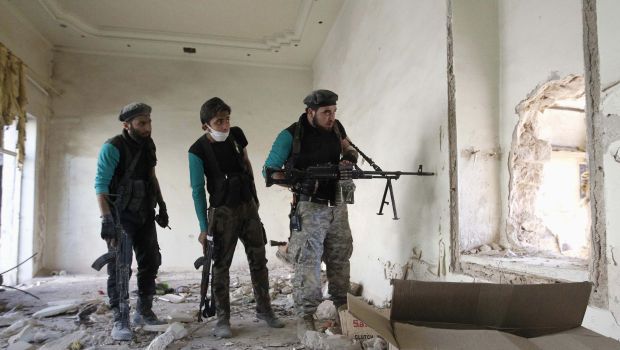
Free Syrian Army fighters carry their weapons as they peek out from a room, during clashes with forces loyal to Syria’s President Bashar Al-Assad in the old city of Aleppo on April 27, 2014. Picture taken April 27, 2014. (Reuters/Jalal Al-Mamo)
Beirut, Asharq Al-Awsat—Eleven Free Syrian Army (FSA) brigades have threatened to lay down their arms and withdraw from the fight against the advancing Islamic State of Iraq and Syria (ISIS) unless they are provided with vital military supplies.
FSA brigades fighting in the Aleppo suburbs, the strategically important town of Raqqa in the north and Deir Ezzor in eastern Syria, issued a joint statement giving the Syrian National Coalition—the political wing of the FSA—one week to send much-needed reinforcements and supplies.
The statement stressed that the Syrian revolution was under threat following ISIS’s announcement of the establishment of an Islamic caliphate across parts of Syria and Iraq.
The FSA brigades that signed the statement included the Al-Jihad Fi Sabeel Allah Brigade, the Al-Raqqa Revolutionaries Brigade, the Manbaj Brigades, the Eastern Front and Ahrar Syria. These FSA brigades are primarily fighting against ISIS in areas controlled by the Islamist militants.
Abu Ahmed Al-Assimi, a member of the FSA’s Supreme Military Council, informed Asharq Al-Awsat that complaints about the shortage of arms and ammunition among FSA fighters were on the rise. Assimi called on the international community to provide the FSA with the necessary support to confront the nascent Islamic State.
Last week, US President Barack Obama asked the US Congress to authorize 500 million US dollars to provide military training and equipment to “moderate” Syrian rebels. The Obama administration said that arming the moderate opposition would “help defend the Syrian people, stabilize areas under opposition control, facilitate the provision of essential services, counter terrorist threats and promote conditions for a negotiated settlement.”
Speaking to Asharq Al-Awsat, Assimi said: “Angry opposition factions have every right to withdraw or lay down their arms due to the shortages they face.”
He stressed that ISIS was in possession of superior weaponry compared to FSA fighters, and called on the international community to provide the Syrian rebels with sufficiently sophisticated arms to confront the Islamist militants.
“It is a victory that we are still holding out against both the Syrian regime’s army and ISIS after three years,” Assimi said.
He claimed that the FSA was in control of around 60 percent of Syrian territory, which, if verified, would mean that ISIS was in control of far less territory than originally thought. Many observers believe that ISIS could lose control of some territory in Syria after spreading across the borders into western and central parts of Iraq, with the Islamist militant group fighting a battle on three sides against more moderate Syrian rebels, the Assad regime and now the Iraqi military.
Assimi expressed disappointment towards the international community’s lack of response to the demands of the Syrian rebels. “The expansion of ISIS’s influence is the result of the international community’s dithering,” he said.
“ISIS in Syria today is fighting the FSA more than they are fighting the Assad regime, but our morale remains high,” he added.
ISIS leader Abu Bakr Al-Baghdadi, the self-styled Caliph Ibrahim, has called on jihadists across the world to migrate to ISIS’s new Islamic State.
Brookings Research Institute in Doha, Qatar, estimates the numbers of ISIS fighters at around 13,000, meaning that the Islamist militant group is thinly stretched while fighting against both the Syrian and Iraqi military forces, as well as fellow Syrian rebels.
Mohammad Abu Rumman, Islamic Ideology Affairs Researcher at Jordan University Center for Strategic Studies, told Asharq Al-Awsat: “ISIS needs more human resources because they are an important part of the military and security operation of the organization.”

Trackbacks/Pingbacks